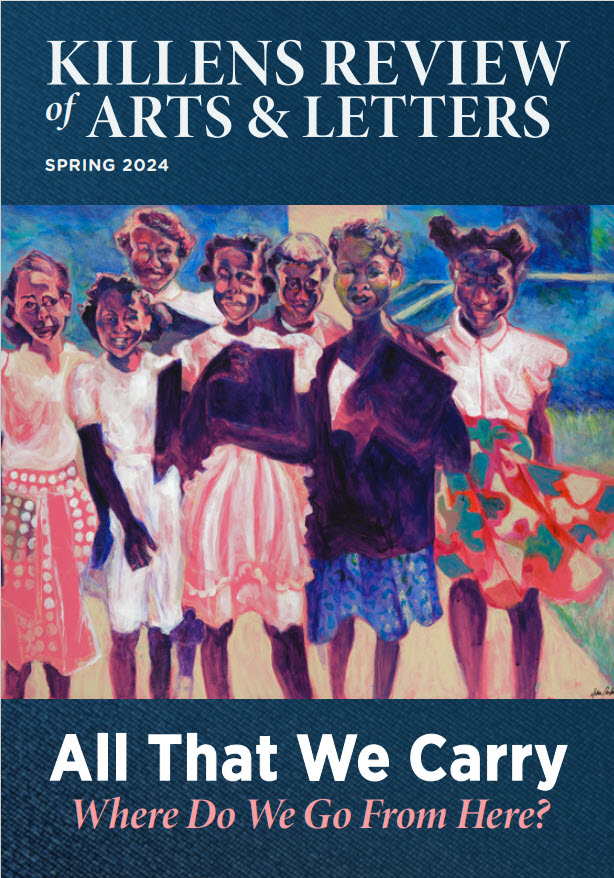Killens Review of Arts & Letters (Spring 2024): All That We Carry
Description of Killens Review of Arts & Letters (Spring 2024): All That We Carry
This issue of the Killens Review of Arts & Letters stems from the theme of the 17th National Black Writers Conference: All That We Carry: Where Do We Go From Here? Inspired by questions posed by Dr. Tiya Miles, Rev. Dr. Martin Luther King, Jr., and other Black intellectuals who have emphasized the value of Black collective action, the long arc of the Black freedom struggle, and the non-linear nature of progress, the editorial team solicited writing and visual art that represents how Black communities move forward when all around us is in disarray. We asked Black creatives to submit work exploring the motifs of legacy, memory, inheritance, hope, and pessimism, with an orientation toward the future and future generations of Black peoples. Our contributors answered this call gorgeously.
Due to their abundant divergences, the pieces in this issue preclude a neat editorial introduction. Yet, Jasper Joyner’s poem, “san·ko·fa,” issues a directive that reverberates throughout the work featured: With discernment and care, we must go back and retrieve the memories of our collaboratively constructed pasts to face our present(s) and future(s) honestly. As essayist Roger S. Glass intimates, in “In My Ancestors’ Footsteps,” not even ignorance of history saves us from its influence.
Certainly, the study of history is facilitated by record-keeping. Several contributors, including Debra Jean Ambush whose art commemorates the 70th anniversary of the Brown v. Board of Education Supreme Court decision, remind us that Black archival practices are crucial. Creating and preserving historical records for ourselves, for our communities, and for posterity is one of our most pressing social responsibilities. However, we must remember that records also facilitate reckonings. As we relish the feelings of pride, hope, and reverence that these pieces evoke, I also want us to save room for the reality that inheritances, including well-intentioned gifts, often carry pain, violence, fear, and uncertainty about the future into the lives of their beneficiaries. The past, as our contributors highlight, is never to be romanticized.
Given the issue’s theme, I would be remiss if I did not acknowledge that my editorship marks a new leg of the journal’s history. Clarence V. Reynolds, the Killens Review’s longstanding Editor-in-Chief and Director of Literary Programs at the Center for Black Literature, has retired. Assuming his editorial title, I am simultaneously honored and apprehensive. The force of Clarence’s dedication, generosity, and brilliance means that I am inheriting a journal boasting a dynamic community of writers, artists, and, most important, readers. I have big shoes to fill.
Unequivocally, a deep consideration of the past also necessitates an acknowledgement of the journal’s namesake, John Oliver Killens. In addition to bequeathing us his oeuvre of Black literary genius, Killens mentored a community of Black writers who continue to carry his beliefs in the transformative power of Black writing and expressive culture. One of these heirs of Killens, Keith Gilyard, became my dissertation advisor. Like John Oliver Killens, Keith Gilyard served on the faculty in the English Department of Medgar Evers College, the same department in which I am undertaking a career in academia and the editorship of this journal.



